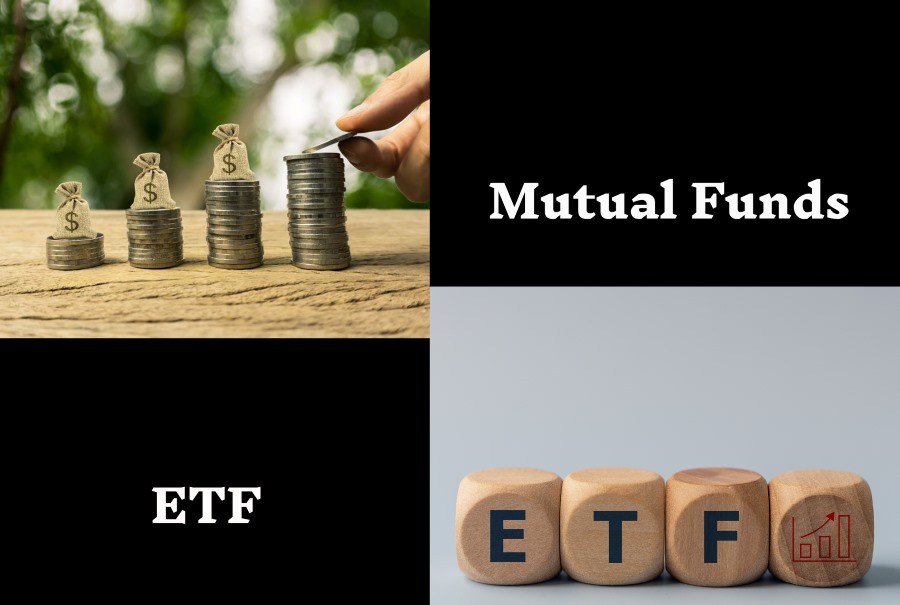Simplifying Life Insurance in India
Difference Between Exchange Traded Funds and Mutual Funds Explained

ETFs and mutual funds are popular investment products. However, their structure and trading mechanisms differ vastly.
Such trades happen on the stock exchange, like individual stocks. At the end of the trading day, investors buy and sell mutual funds based on their NAV.
Understanding the difference between ETFs and mutual funds is essential in investing. Both provide advantages that suit the investor's goal, risk tolerance, and preferences.
Keep reading to learn more about how an ETF differs from mutual funds, its risk, and other important factors.
Quick Summary
Tips
- ETFs are traded on stock exchanges in real-time like shares; mutual funds are transacted once daily at NAV.
- ETF prices fluctuate throughout the day; mutual funds are priced only at the end of the trading day.
- ETFs generally have lower expense ratios but include brokerage fees; mutual funds may have higher ongoing fees and load charges.
- ETFs offer higher liquidity due to intraday trading, while mutual funds are only redeemable at the day-end.
- ETFs suit passive investors seeking cost efficiency and flexibility; mutual funds cater to both active and passive investors with easier access

Table of Contents

What are Exchange Traded Funds?
Exchange-traded funds, or ETFs, are mostly passively managed funds traded on the stock exchange. They comprise stocks and bonds that carry the underlying index's exact value. Individuals can buy, sell, and transfer them quickly.
ETFs are traded throughout the day, so the value of the assets fluctuates, so you need to buy them at their current market price. As mentioned, ETFs solely replicate an index, thus requiring no fund manager to monitor them actively.
ETFs are used for purposes like arbitrage, hedging, and equitising cash. The shareholders receive dividends paid and interest earned as a part of the profit.
What are Mutual Funds?
Mutual funds accumulate funds from various investors and trade in diversified assets. Professional fund managers actively manage these investment funds. These investors put their money in bonds, stocks, debt, or money market instruments.
You purchase or sell a mutual fund at its Net Asset Value or NAV. You can obtain it by dividing the total assets by the number of investors.
The investors hold a share of a mutual fund and experience the same profit or loss as other investors.
Exchange Traded Funds vs Mutual Funds: Which is Better?
Here's a tabular representation of the difference between ETF and mutual funds in India.
If you're planning to invest in mutual funds through a Systematic Investment Plan (SIP), then try our SIP calculator to estimate your potential returns instantly based on monthly contributions and tenure.
Types of ETFs
There are various types of exchange-traded funds (ETFs), such as:
Types of Mutual Funds
Mutual funds can be categorized in several ways, including by asset class, risk, and investment strategy:
Benefits of ETFs and Mutual Funds
ETF is an attractive investment option for most investors. However, mutual Funds also offer many advantages that explain their popularity in investors' minds. Here are some significant benefits of investing in both:
If you're considering a one-time investment in either ETFs or mutual funds, use our lumpsum calculator to project potential returns instantly based on your investment amount and duration.
Once you have your priorities set, you can choose your investment. Mutual funds generally require a longer investment horizon than exchange-traded funds. On the other hand, ETFs offer you higher returns, more flexibility, and tax benefits in the short run.
Now that you know about exchange-traded funds (ETF) versus mutual funds, you can utilize both to build a diversified portfolio.
Disclaimer: The information provided on this website is for general informational purposes only and should not be construed as financial, investment, or legal advice. While we strive to provide accurate and up-to-date content, we do not guarantee the completeness, reliability, or suitability of the information for your specific needs.
We do not promote or endorse any financial product or service mentioned in these articles. Readers are advised to conduct their own research, consult with financial experts, and make informed decisions based on their unique financial circumstances. Any reliance you place on the information provided here is strictly at your own risk.
Compare ETF with Other Investment Options
FAQs about ETF vs Mutual Funds
Which is better, mutual funds or an ETF?
Do ETFs grow faster than mutual funds?
Why is a mutual fund expensive when compared to an ETF?
Are ETFs riskier than Mutual funds?
What is the difference between ETFs and mutual funds?
What are the advantages of mutual funds over ETFs?
Does ETF have an exit load?
Are ETFs tax-efficient when compared to mutual funds?
Why should I choose an ETF over mutual funds?
Which one among ETFs and mutual funds has a lock-in period?
Other Important Articles about Mutual Funds














